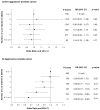Genetic variation in the vitamin d pathway in relation to risk of prostate cancer--results from the breast and prostate cancer cohort consortium
- PMID: 23377224
- PMCID: PMC3617077
- DOI: 10.1158/1055-9965.EPI-13-0007-T
Genetic variation in the vitamin d pathway in relation to risk of prostate cancer--results from the breast and prostate cancer cohort consortium
Abstract
Background: Studies suggest that vitamin D status may be associated with prostate cancer risk although the direction and strength of this association differs between experimental and observational studies. Genome-wide association studies have identified genetic variants associated with 25-hydroxyvitamin D [25(OH)D] status. We examined prostate cancer risk in relation to single-nucleotide polymorphisms (SNP) in four genes shown to predict circulating levels of 25(OH)D.
Methods: SNP markers localized to each of four genes (GC, CYP24A1, CYP2R1, and DHCR7) previously associated with 25(OH)D were genotyped in 10,018 cases and 11,052 controls from the National Cancer Institute (NCI) Breast and Prostate Cancer Cohort Consortium. Logistic regression was used to estimate the individual and cumulative association between genetic variants and risk of overall and aggressive prostate cancer.
Results: We observed a decreased risk of aggressive prostate cancer among men with the allele in rs6013897 near CYP24A1 associated with lower serum 25(OH)D [per A allele, OR, 0.86; 95% confidence interval (CI), 0.80-0.93; Ptrend = 0.0002) but an increased risk for nonaggressive disease (per A allele: OR, 1.10; 95% CI, 1.04-1.17; Ptrend = 0.002). Examination of a polygenic score of the four SNPs revealed statistically significantly lower risk of aggressive prostate cancer among men with a greater number of low vitamin D alleles (OR for 6-8 vs. 0-1 alleles, 0.66; 95% CI, 0.44-0.98; Ptrend = 0.003).
Conclusions: In this large, pooled analysis, genetic variants related to lower 25(OH)D levels were associated with a decreased risk of aggressive prostate cancer.
Impact: Our genetic findings do not support a protective association between loci known to influence vitamin D levels and prostate cancer risk.
Conflict of interest statement
Figures
References
-
- Bouillon R, Eelen G, Verlinden L, Mathieu C, Carmeliet G, Verstuyf A. Vitamin D and cancer. J Steroid Biochem Mol Biol. 2006;102:156–62. - PubMed
-
- Holick MF. Vitamin D: its role in cancer prevention and treatment. Prog Biophys Mol Biol. 2006;92:49–59. - PubMed
-
- Yin L, Raum E, Haug U, Arndt V, Brenner H. Meta-analysis of longitudinal studies: Serum vitamin D and prostate cancer risk. Cancer Epidemiol. 2009;33:435–45. - PubMed
Publication types
MeSH terms
Substances
Grants and funding
- N01-RC-45035/RC/CCR NIH HHS/United States
- HHSN261201000006C/CP/NCI NIH HHS/United States
- U01-CA98233-07/CA/NCI NIH HHS/United States
- Z01 CP010195/ImNIH/Intramural NIH HHS/United States
- U01-CA98710-06/CA/NCI NIH HHS/United States
- U01-CA98216-06/CA/NCI NIH HHS/United States
- T32 CA09001/CA/NCI NIH HHS/United States
- ZIA CP010195/ImNIH/Intramural NIH HHS/United States
- U01 CA098233/CA/NCI NIH HHS/United States
- T32 CA009001/CA/NCI NIH HHS/United States
- N01 RC037004/RC/CCR NIH HHS/United States
- U01-CA98758-07/CA/NCI NIH HHS/United States
- R01 CA097193/CA/NCI NIH HHS/United States
- U01 CA098216/CA/NCI NIH HHS/United States
- Y99 CA999999/CA/NCI NIH HHS/United States
- U01 CA098758/CA/NCI NIH HHS/United States
- Z99 CA999999/ImNIH/Intramural NIH HHS/United States
- N01 CN045165/CN/NCI NIH HHS/United States
- HHSN261200800001C/RC/CCR NIH HHS/United States
- HHSN261200800001E/CA/NCI NIH HHS/United States
- U01 CA098710/CA/NCI NIH HHS/United States
LinkOut - more resources
Full Text Sources
Other Literature Sources
Medical
Miscellaneous



